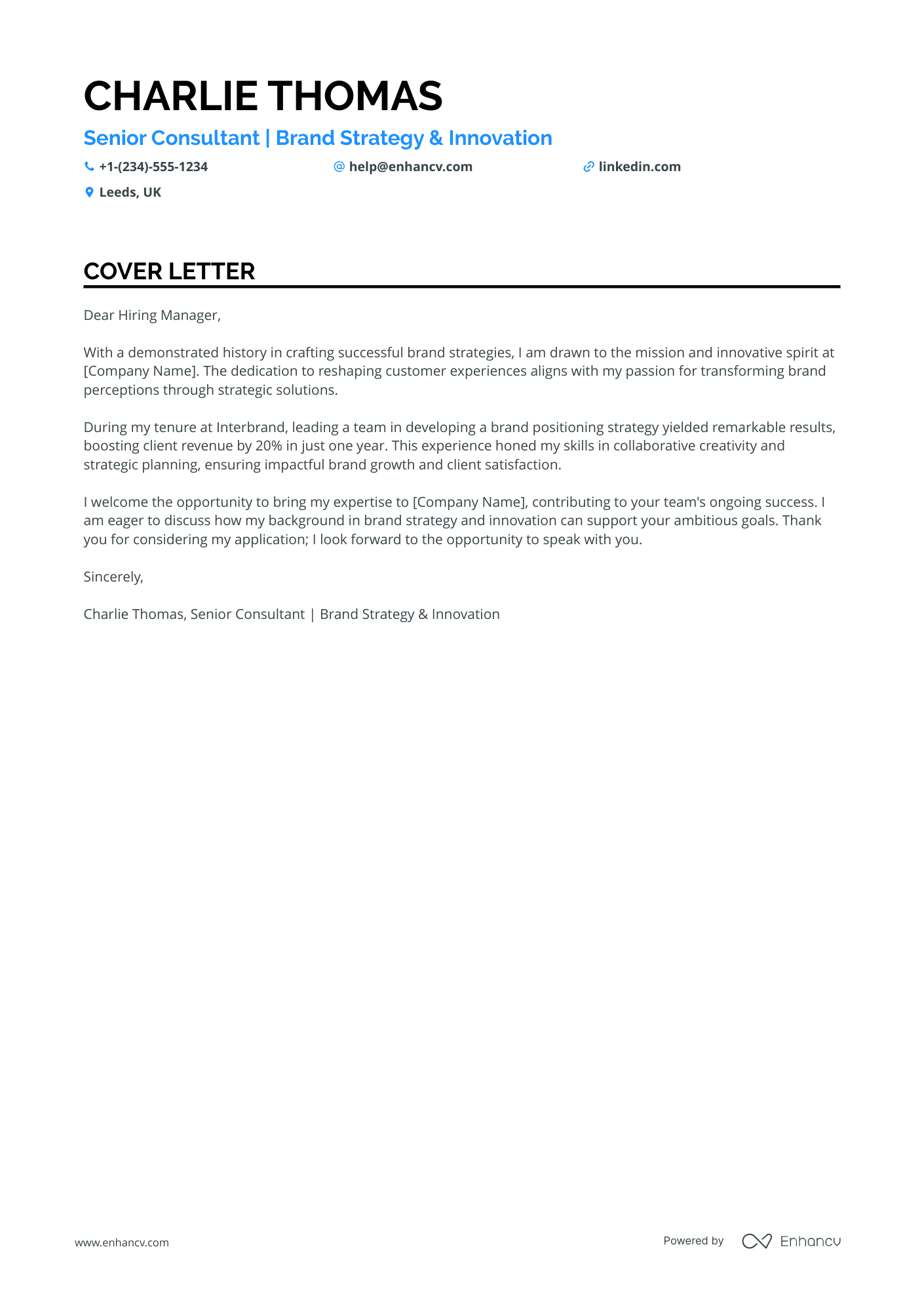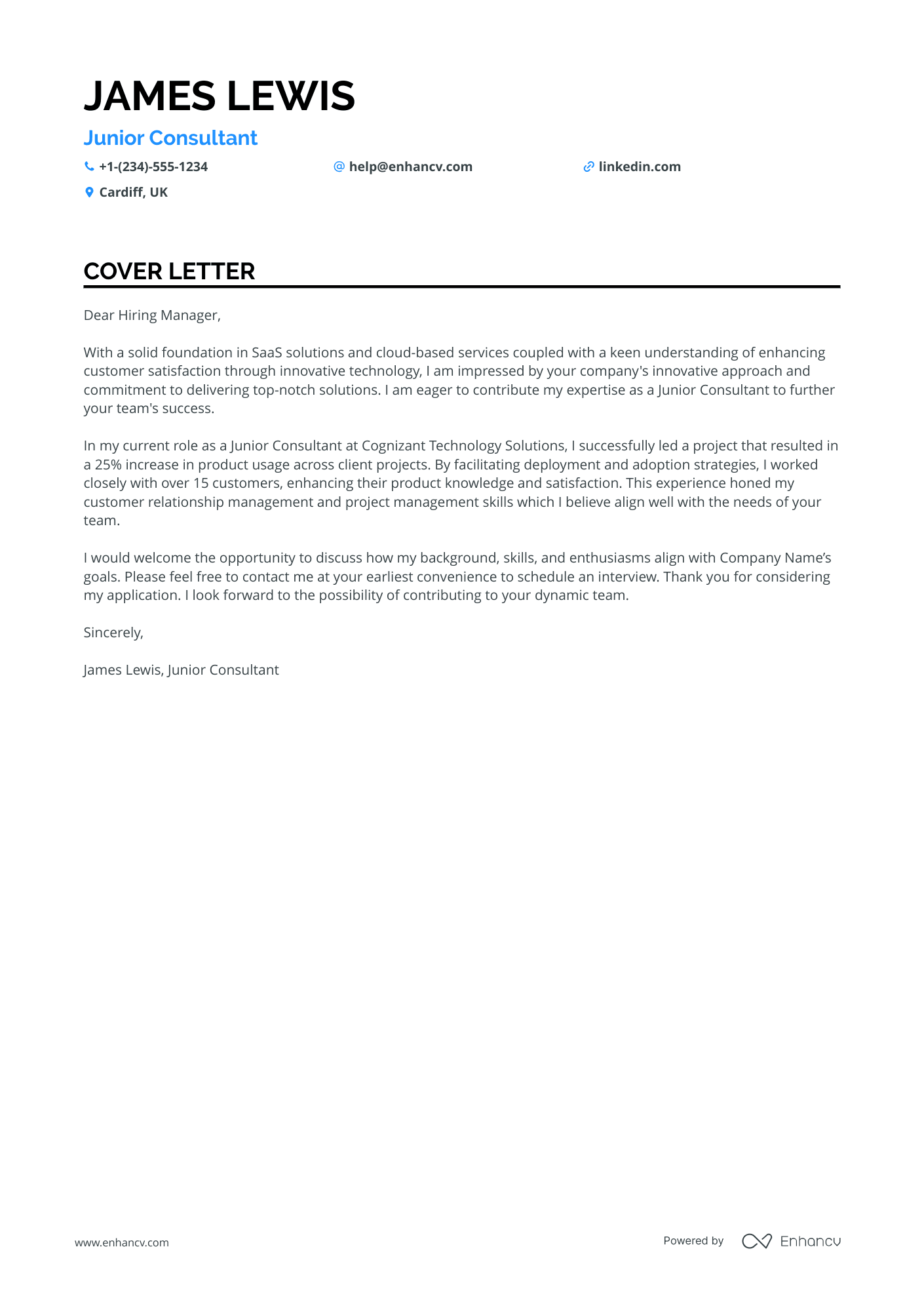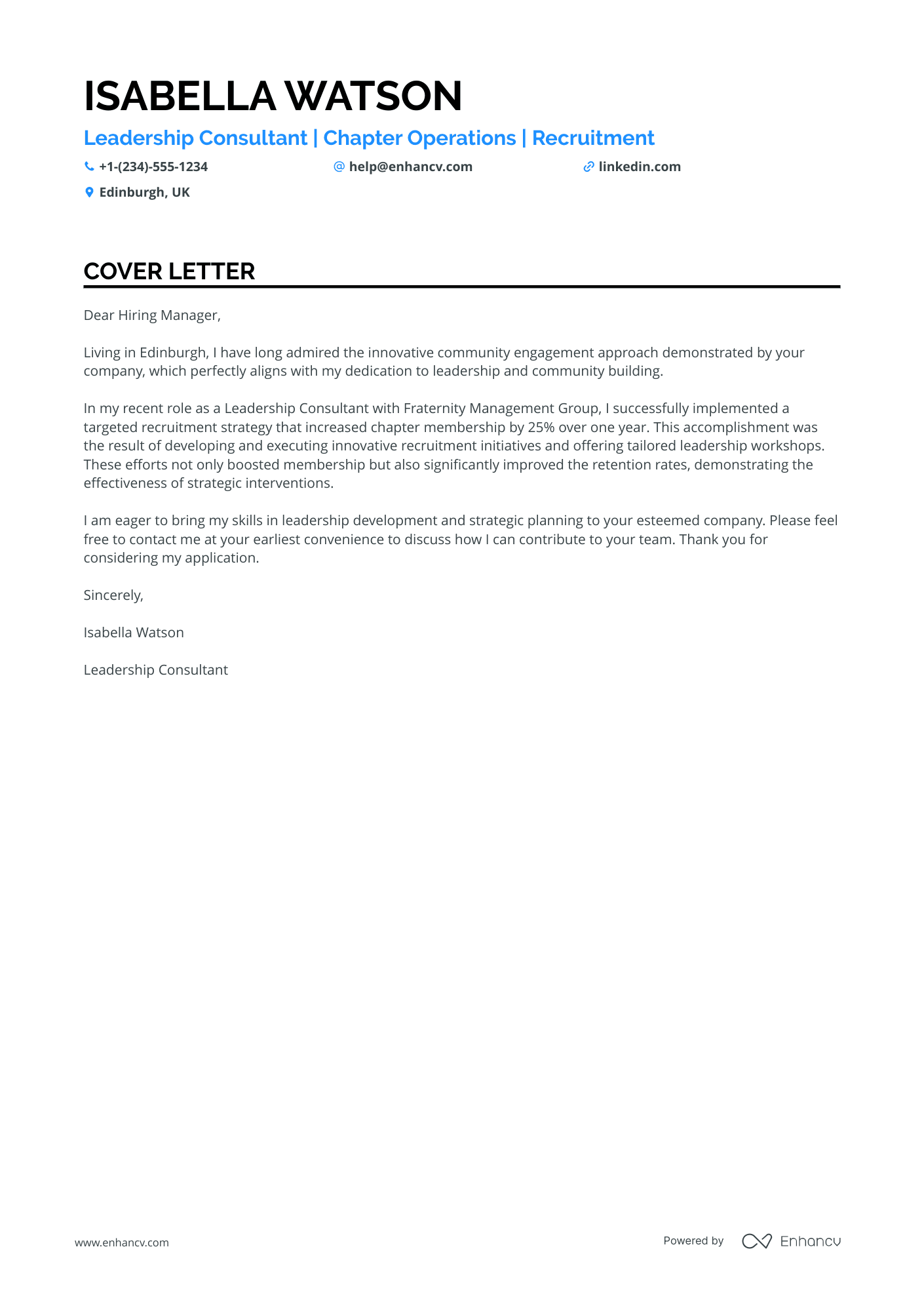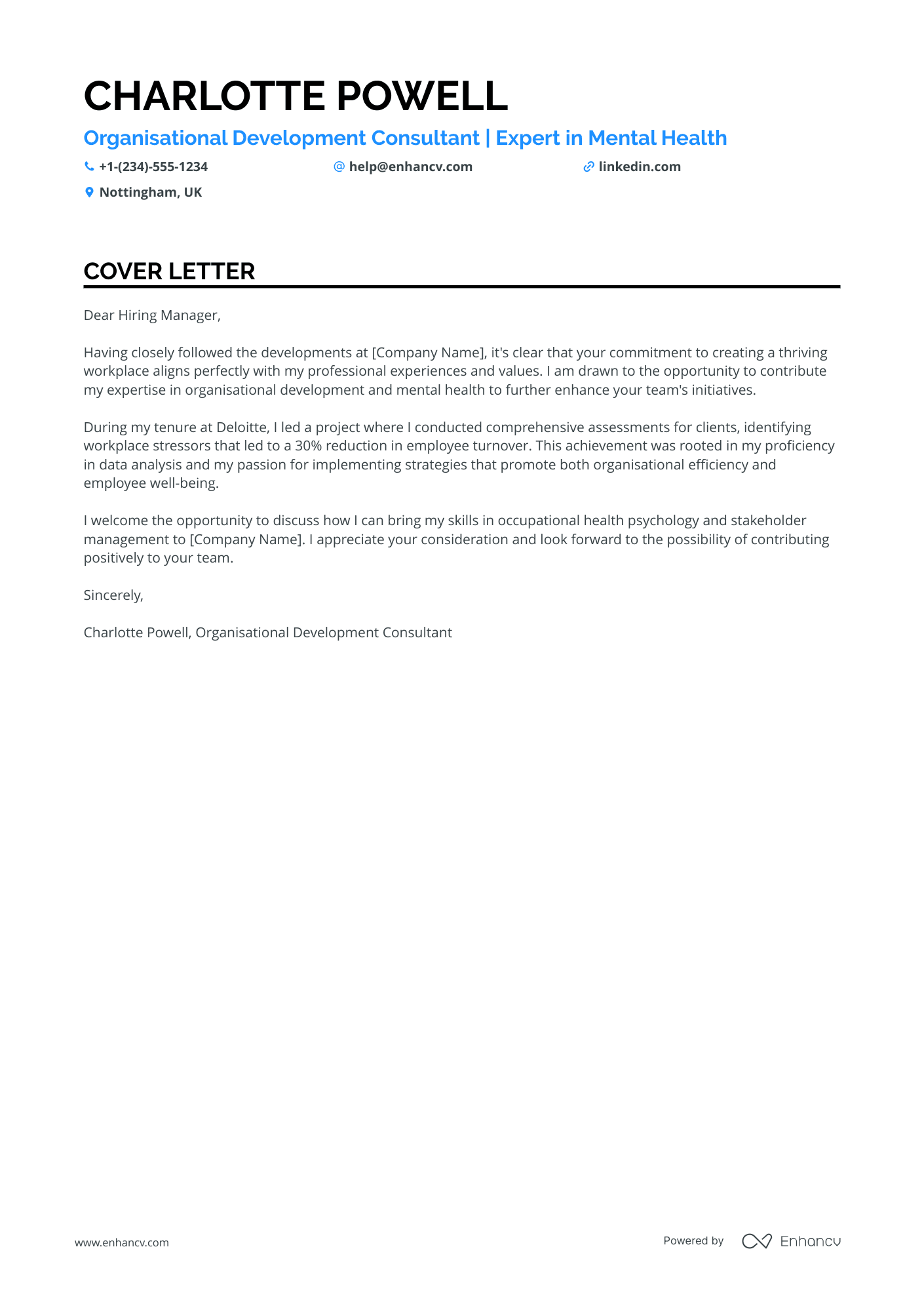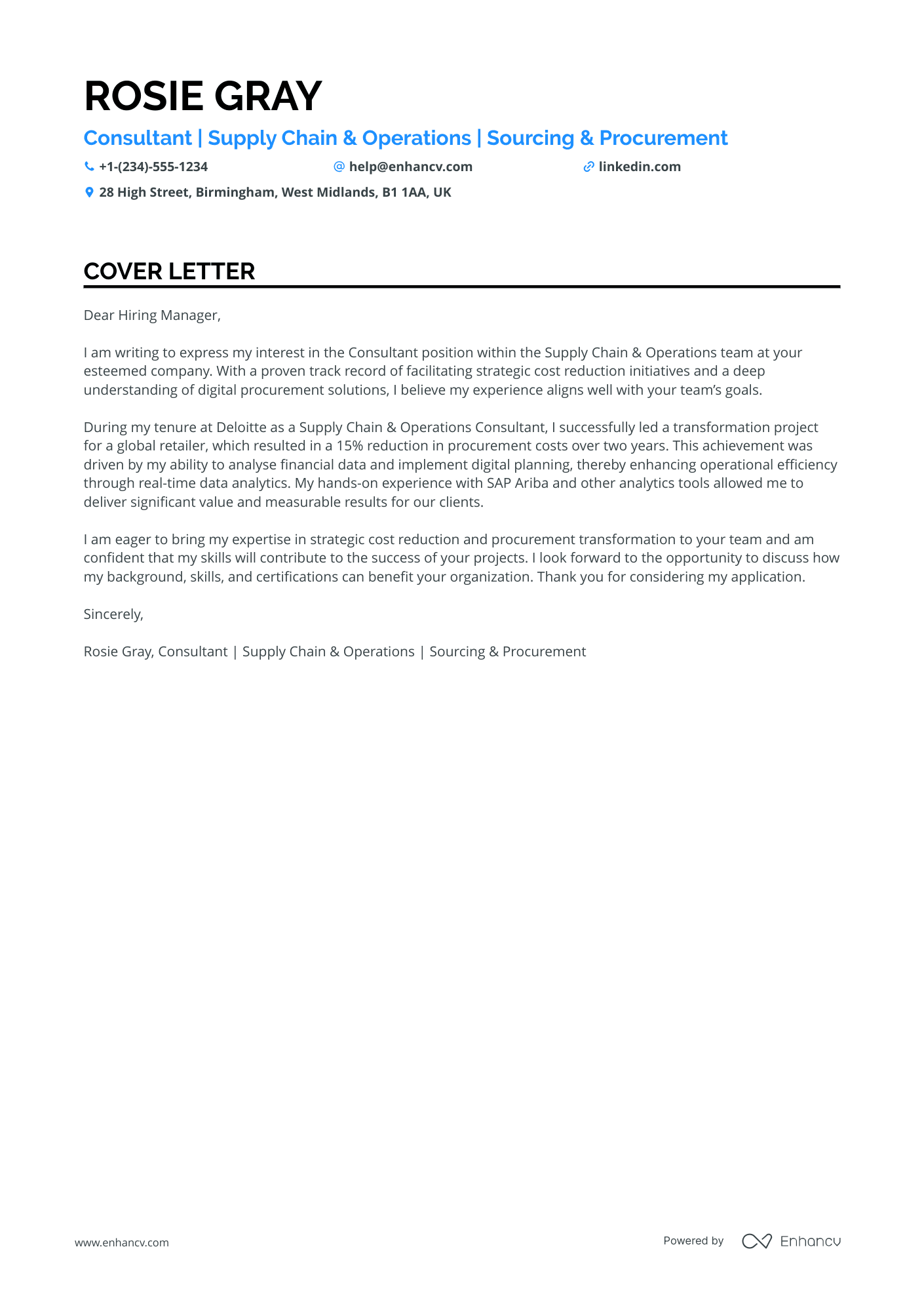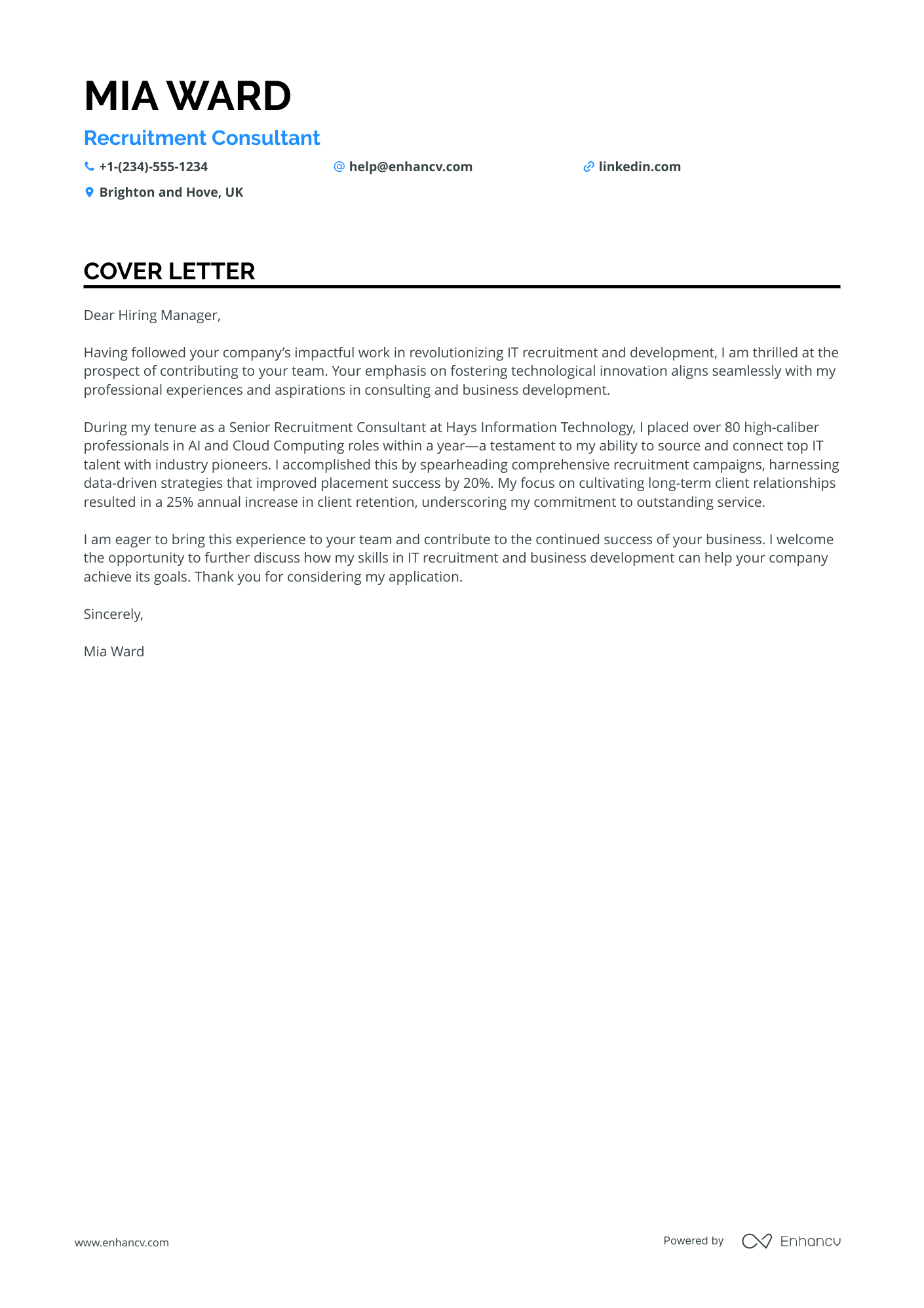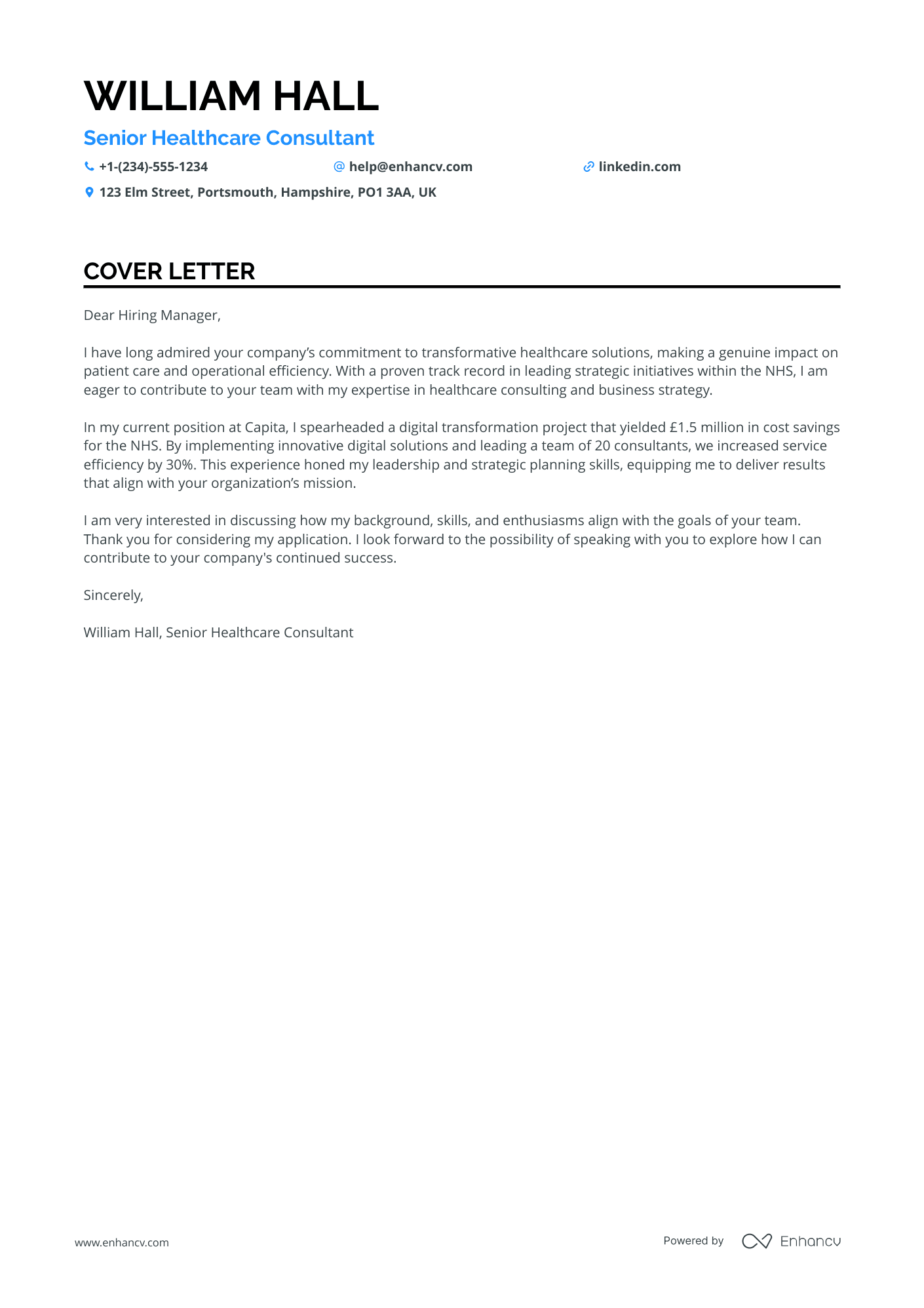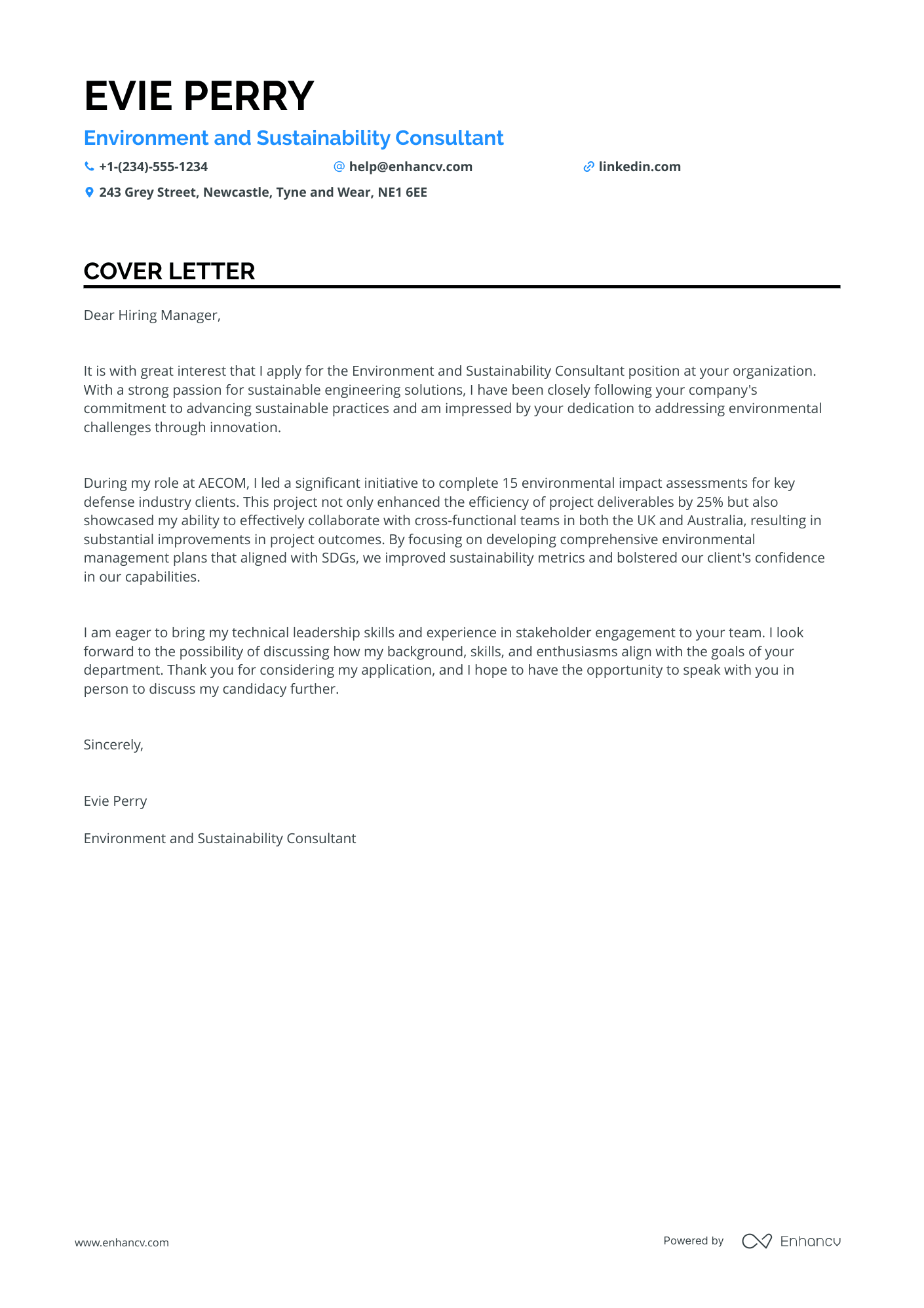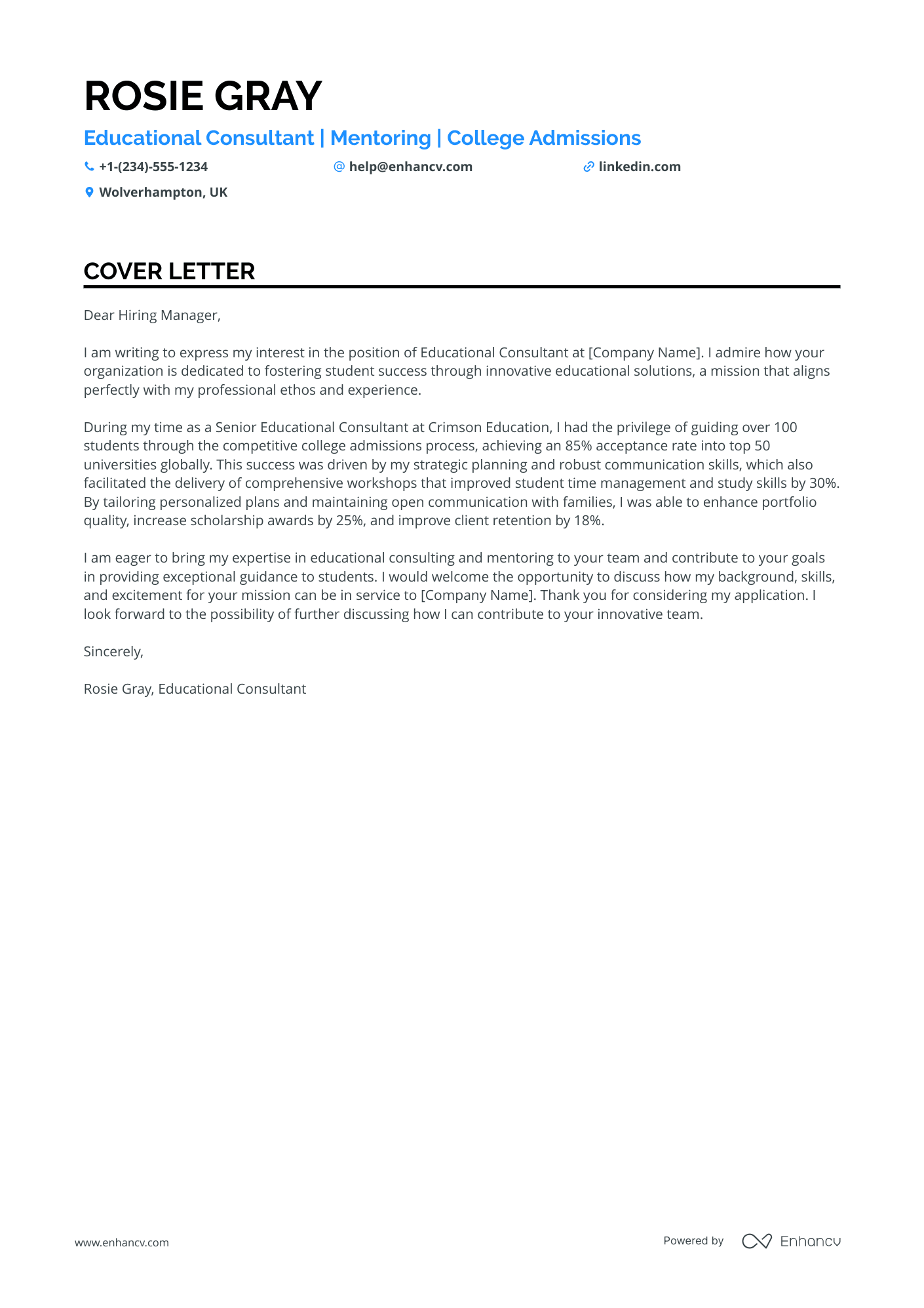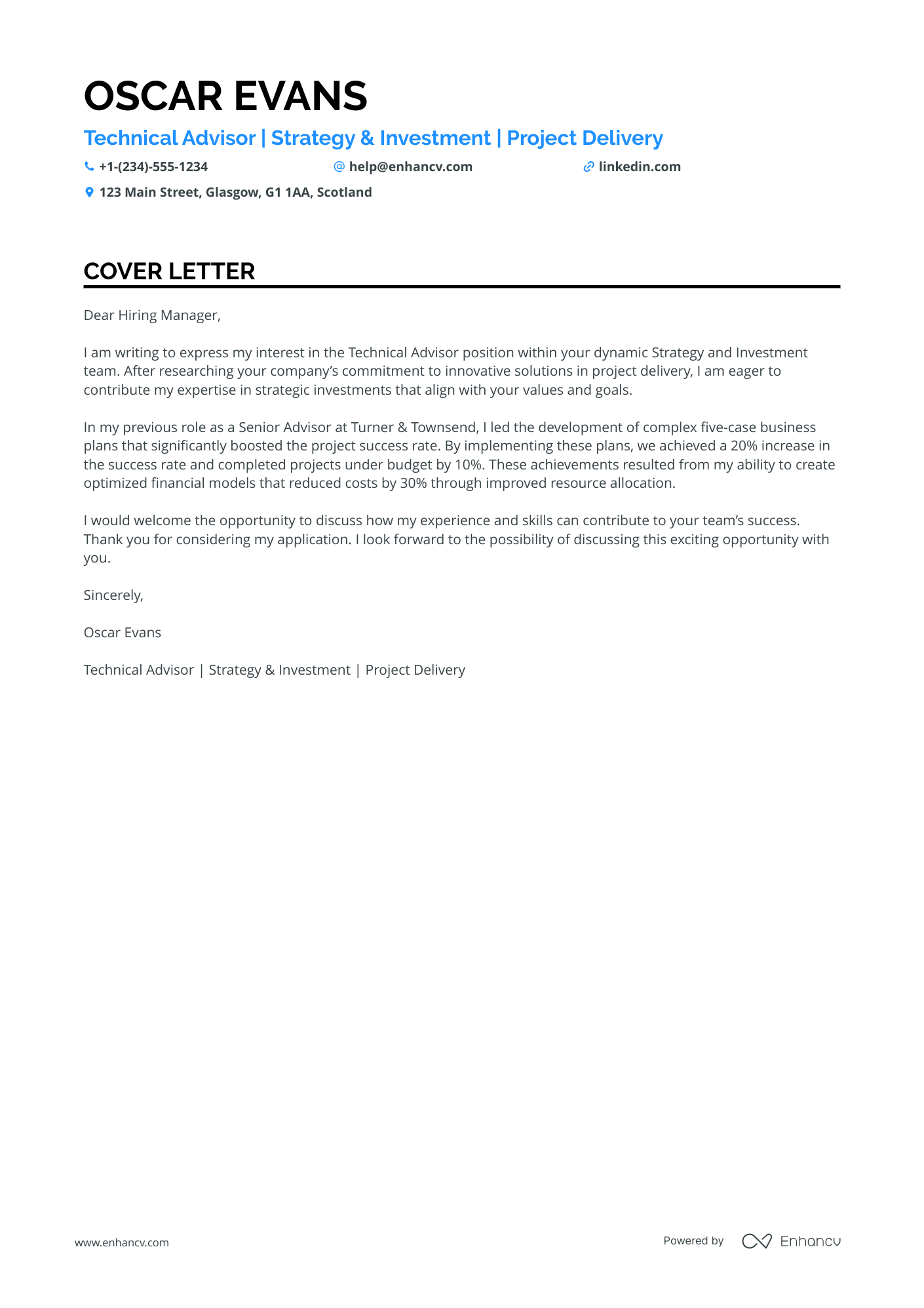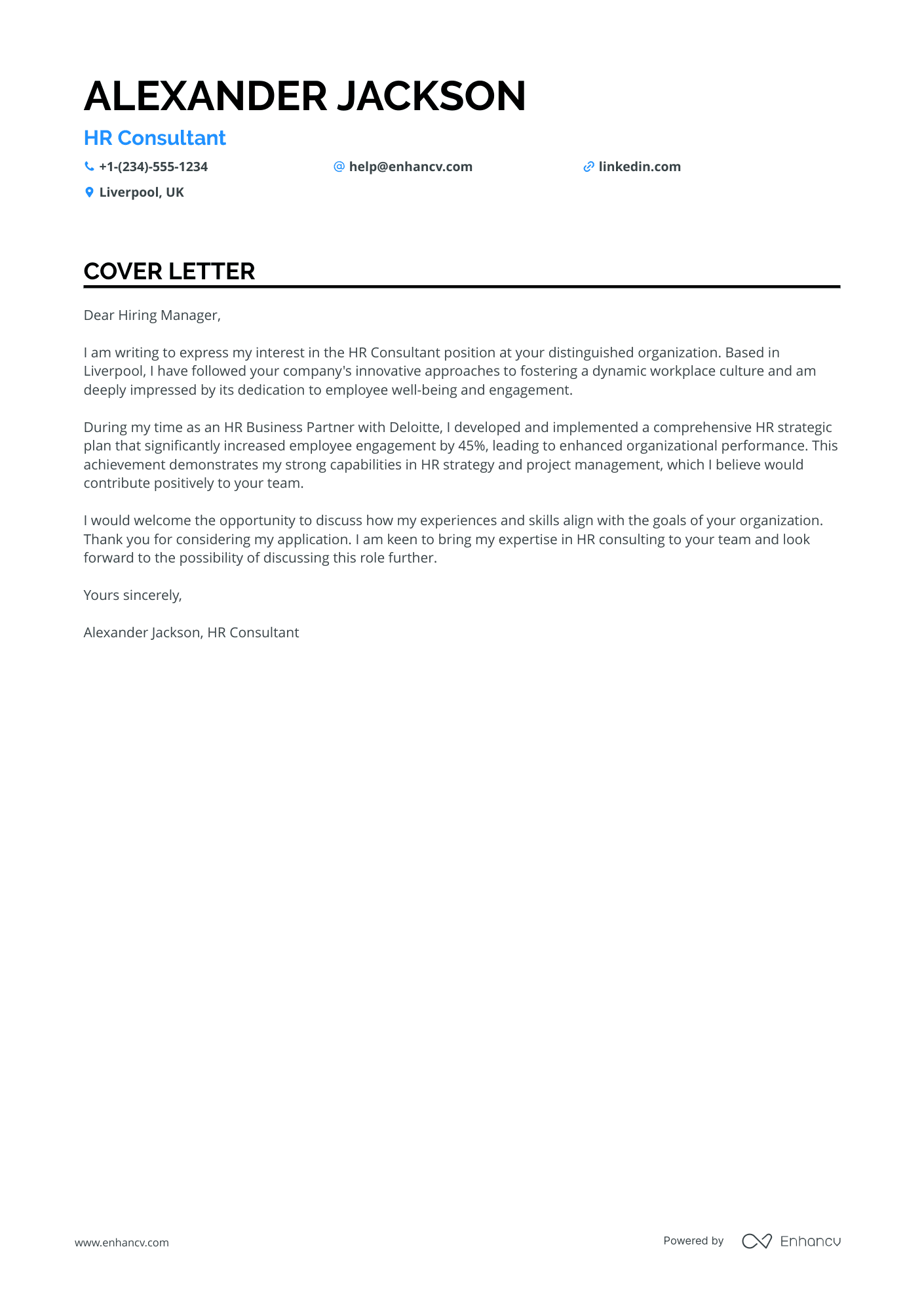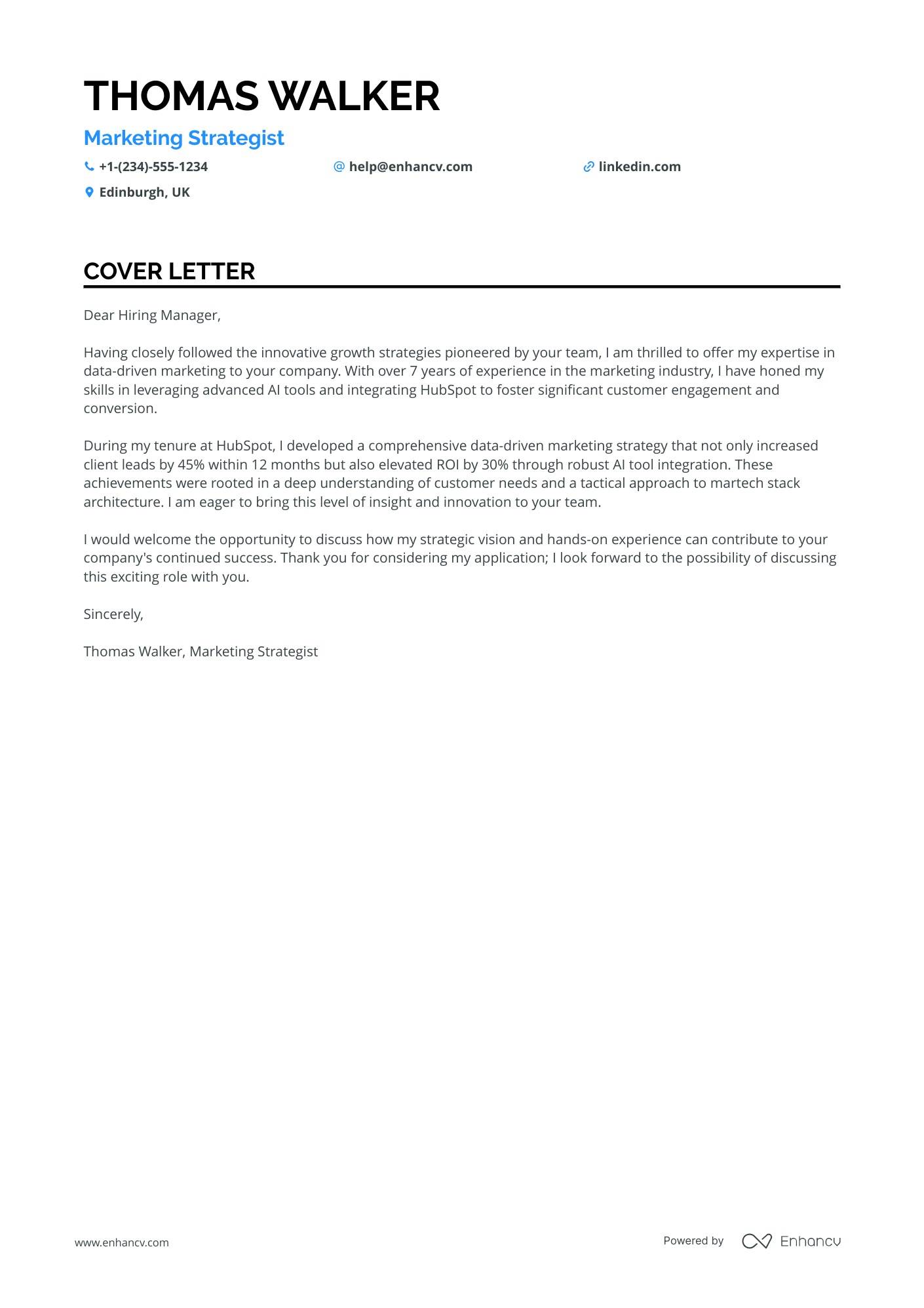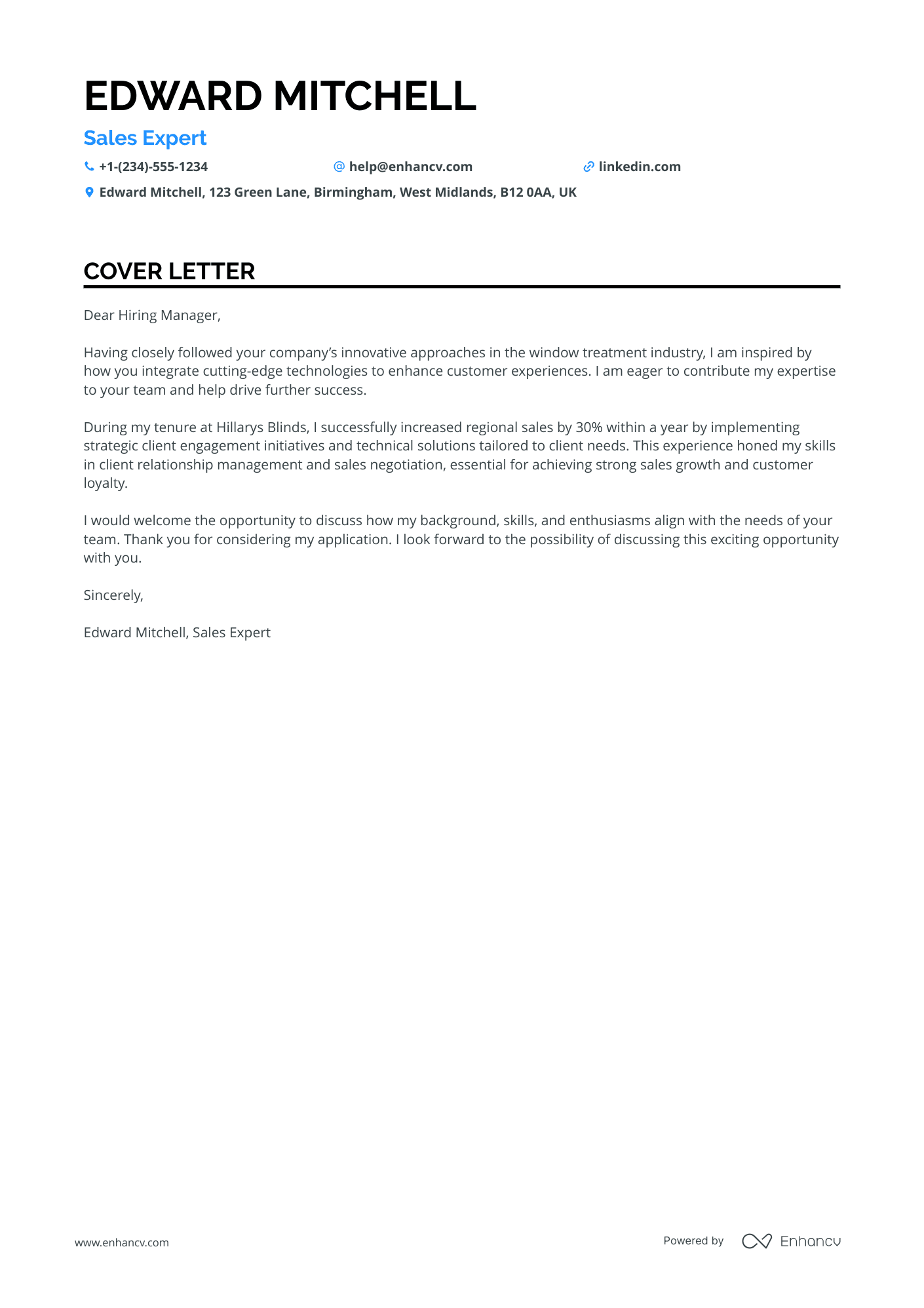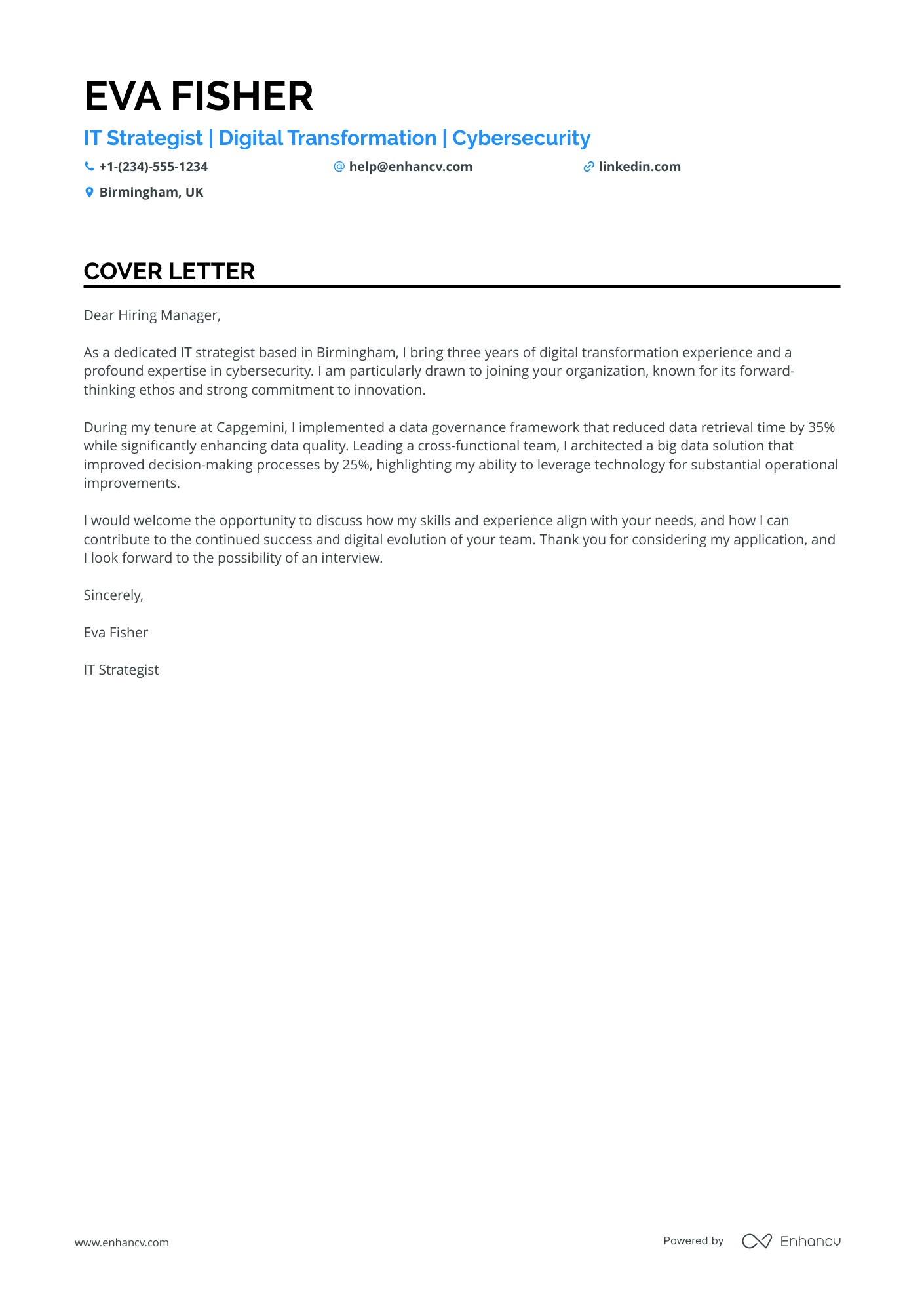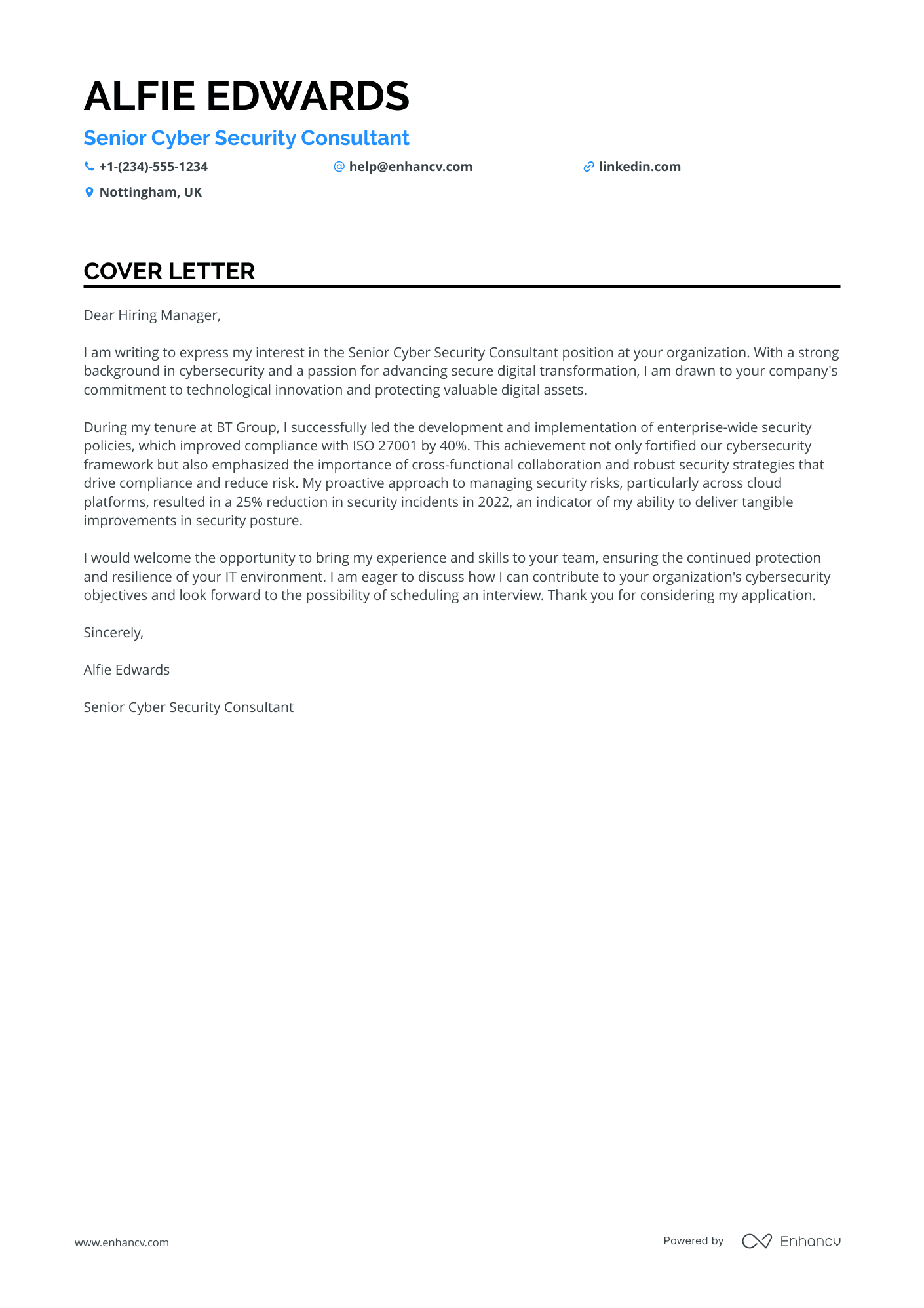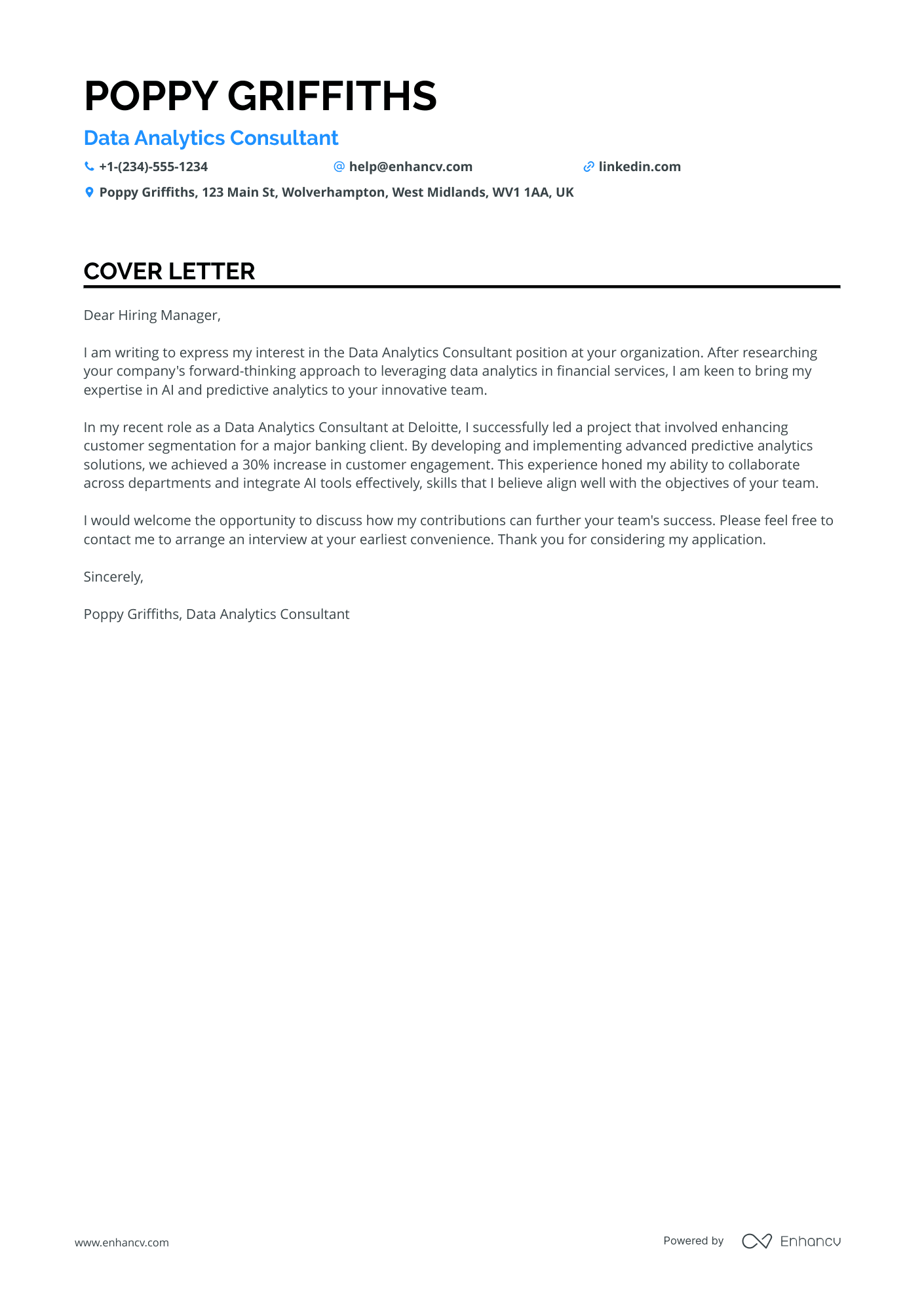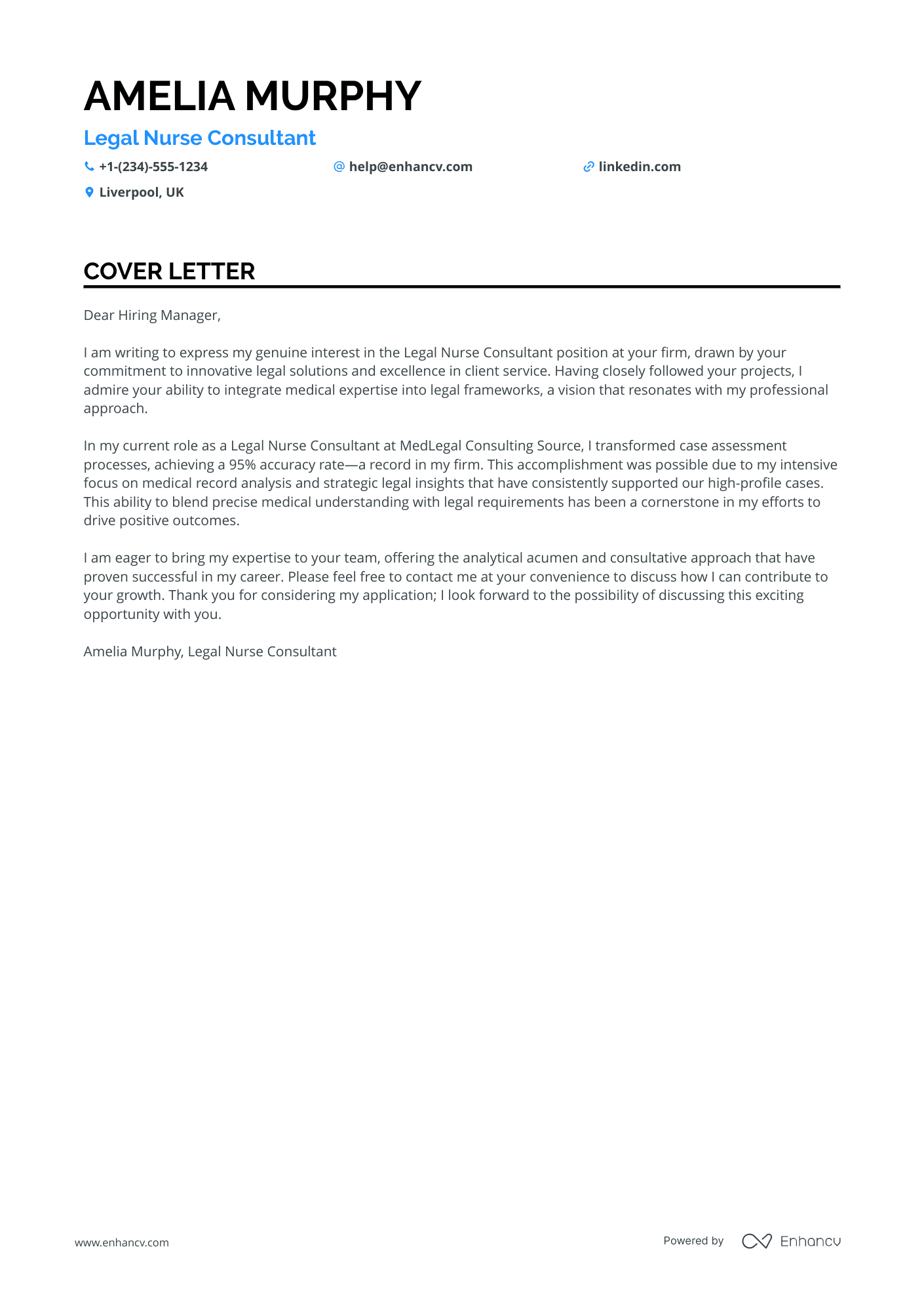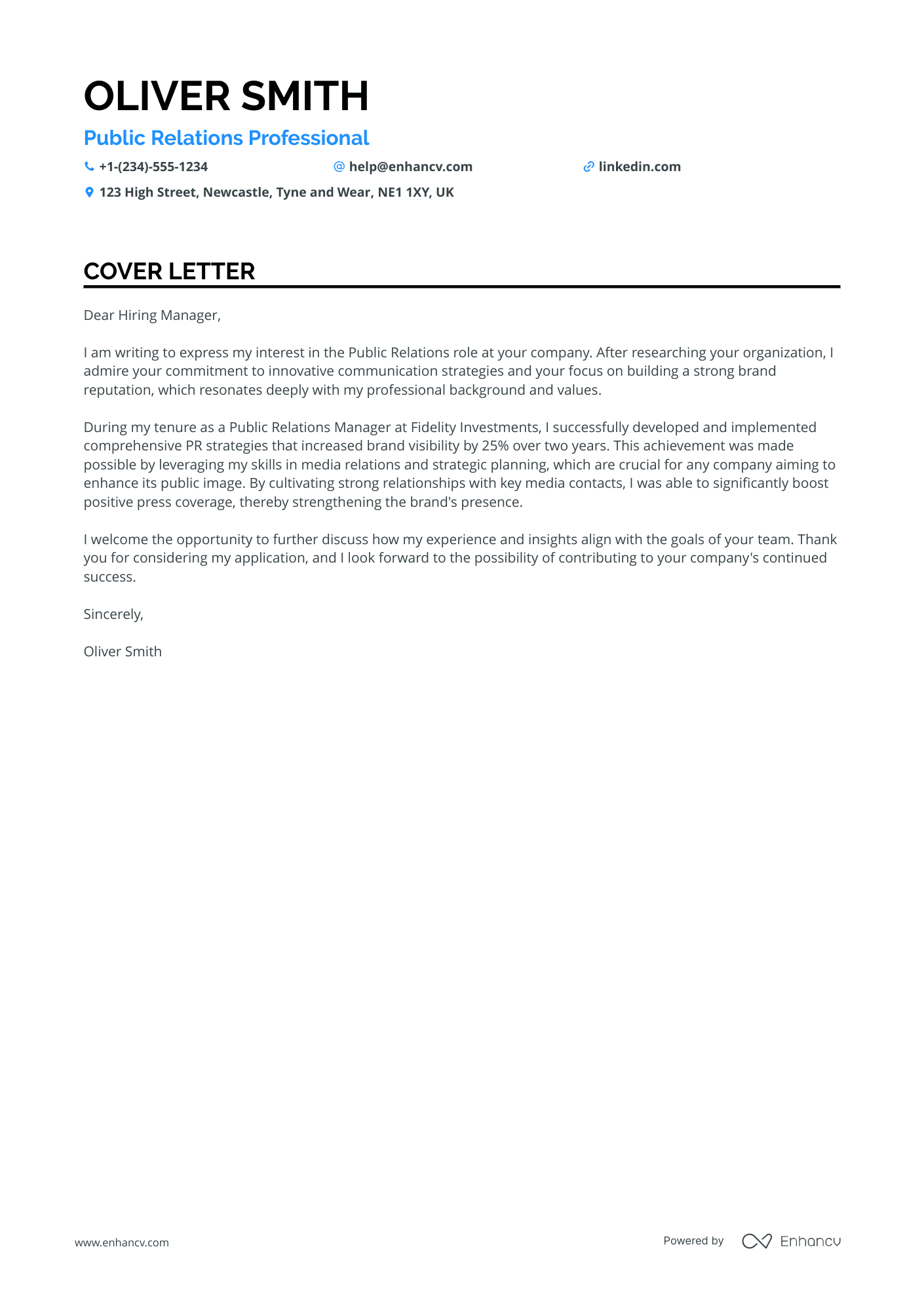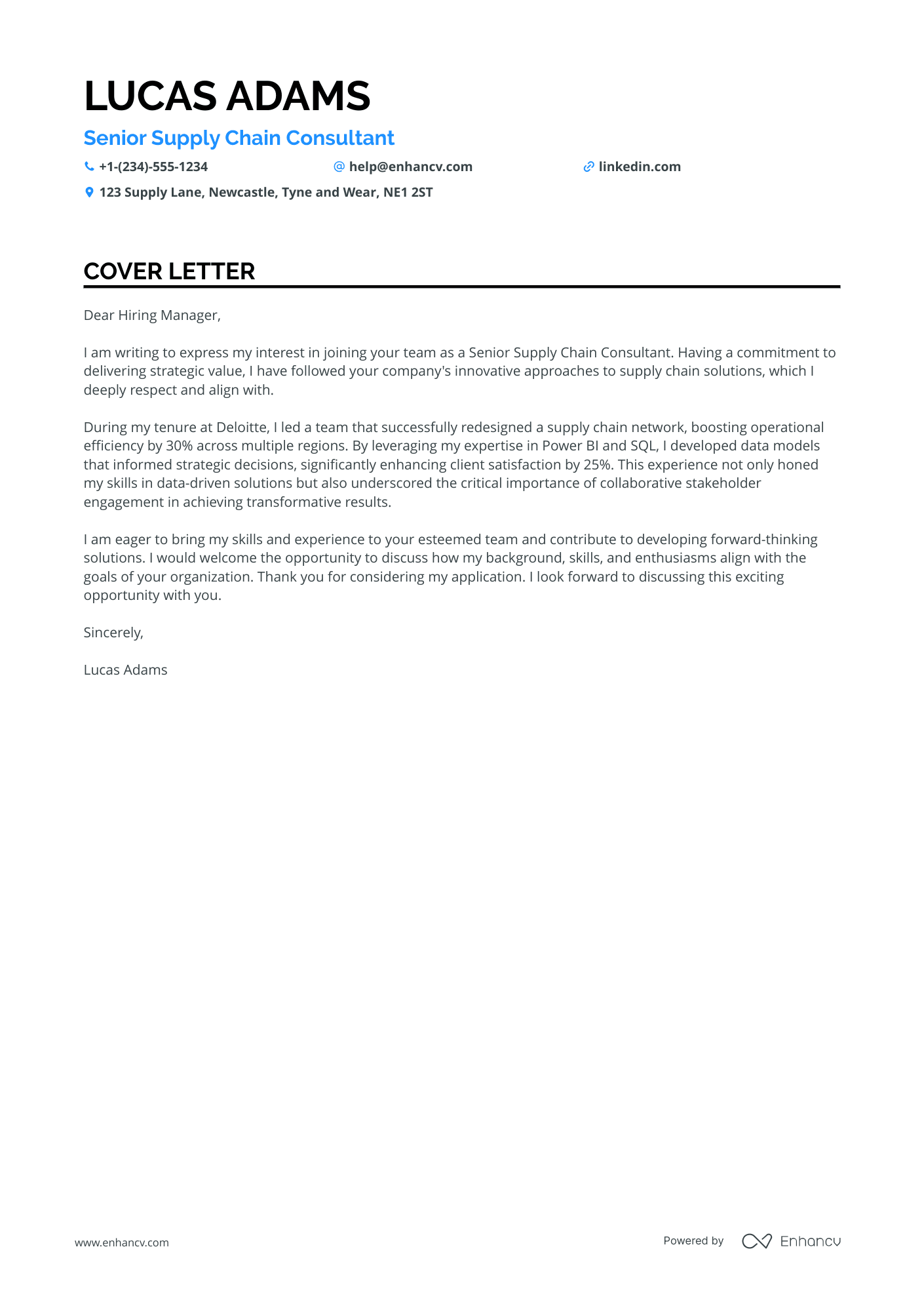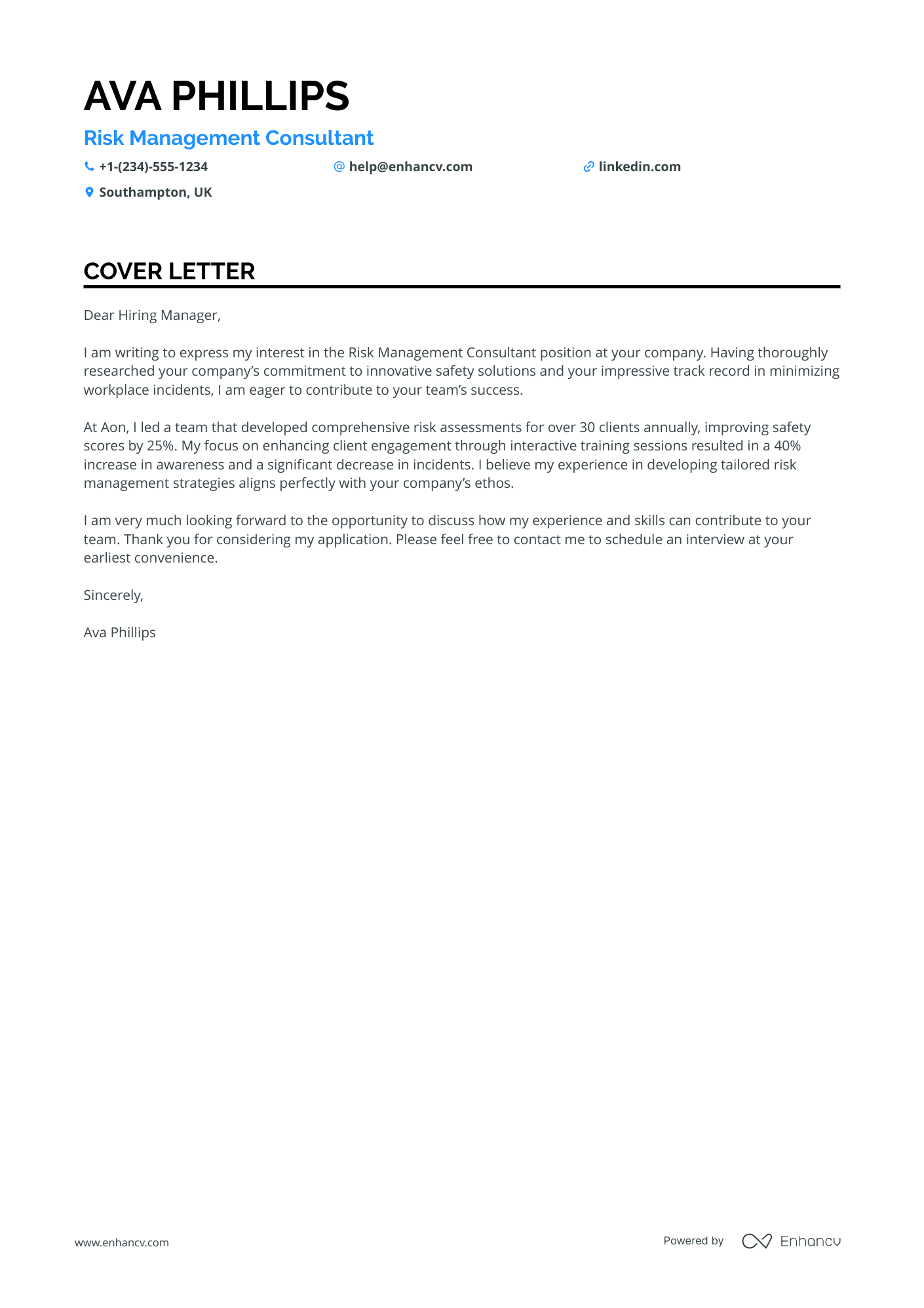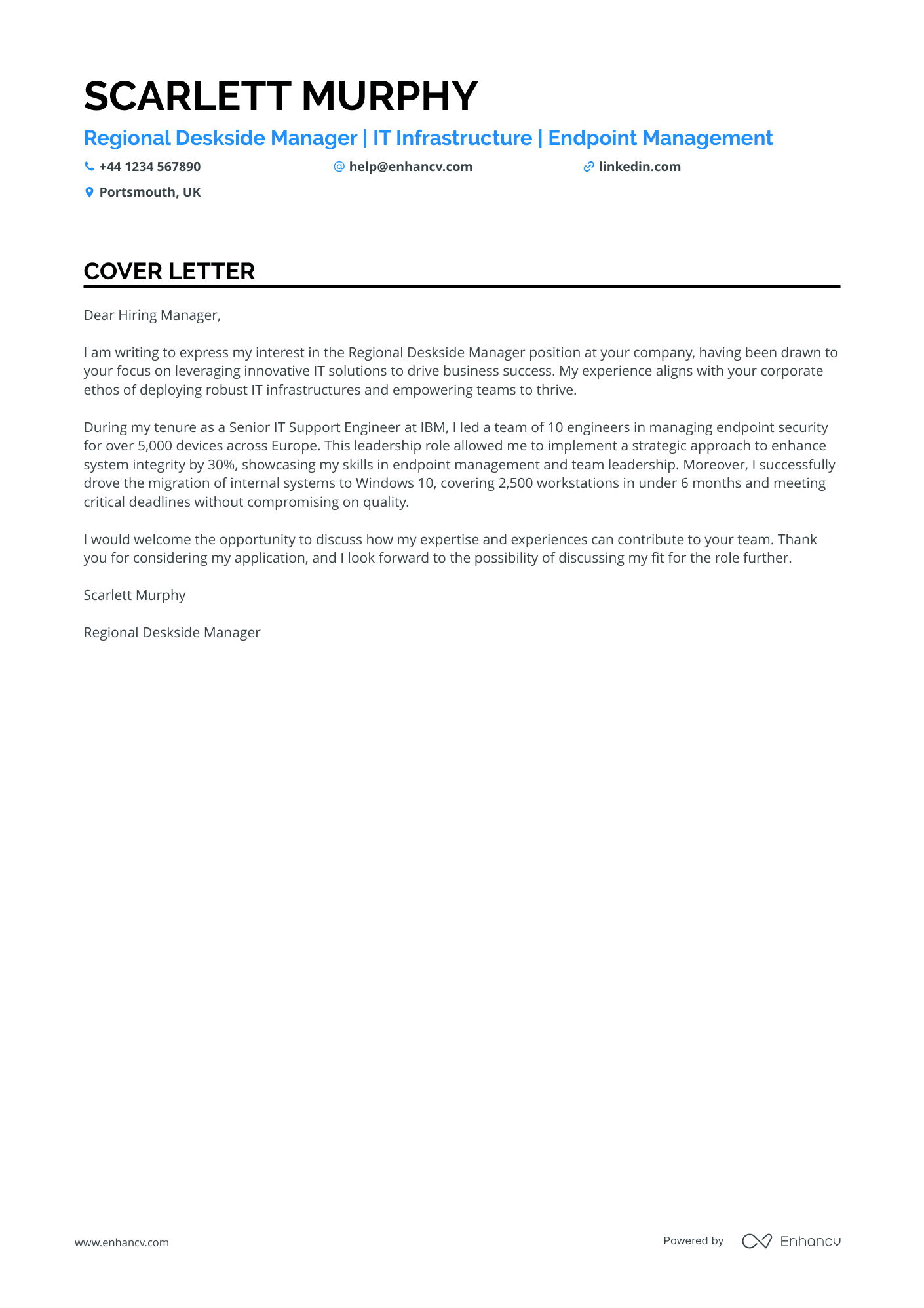Congratulations on completing your first cover letter. However, as you look back, you realise it’s simply a copy-paste of your CV.
Repeating your curriculum vitae is a common pitfall that many candidates encounter, making the cover letter redundant.
Your cover letter should provide fresh insights, adding more value to your application. It’s also the ideal space to address career gaps or major transitions that might not be covered in your CV.
In this guide, you’ll learn how to use your cover letter to demonstrate why you’re the best candidate for the role, while confidently addressing your career history and key achievements.
Cover letter examples for consultant
By Experience
Senior Business Strategy Consultant
- Highlighting the candidate's significant experience in brand strategy and innovation, particularly their ability to increase brand awareness by 20%, showcases their expertise and value to potential employers.
- Mentioning specific quantifiable achievements, such as facilitating workshops that improved project delivery timelines by 25%, provides concrete evidence of their ability to effectively manage teams and processes.
- Emphasising their academic background with a Master's degree in Strategic Marketing adds credibility, showing they have a strong foundation in the theoretical aspects of marketing and strategy.
- Referencing successful collaborations with designers to create unique brand identities that increased market penetration by 10% highlights their ability to work effectively in cross-functional teams to achieve strategic goals.
Junior Management Consultant
- Highlight Relevant Experience: Emily effectively showcases experience in SaaS solutions and cloud services, specifically her role at Cognizant Technology Solutions, which aligns with her desired position as a Junior Consultant. This provides credibility and relevance to her application.
- Certifications and Courses: Emily mentions the Cloud Computing Specialisation and Certified SaaS Specialist, demonstrating her dedication to continuous professional development, which is crucial for a role in fast-evolving technology fields.
- Achievements and Impact: Emphasising measurable achievements such as reducing service resolution times by 40% and managing large-scale SaaS deployments indicates her ability to deliver concrete results and impact business operations positively.
- Skills and Professional Development: Skills such as Project Management, Customer Relationship Management, and Software Implementation are directly relevant to the Junior Consultant role, showing her capability to handle the job’s demands.
Executive Leadership Consultant
- Highlighting Quantifiable Achievements: Isabella's cover letter effectively mentions specific metrics like a 25% growth in membership, a 30% reduction in overdue debts, and a 98% satisfaction rating in national conferences, demonstrating measurable success in leadership consultancy and operations management roles.
- Emphasising Relevant Experience: The extensive experience detailed from different roles at reputable organisations adds credibility, showing a clear progression in leadership and recruitment consultancy skills over time, which is crucial for a Leadership Consultant role.
- Showcasing Leadership and Communication Skills: Isabella includes skills such as `Leadership development`, `Event coordination`, and `Effective communication`, which are critical for a role centred around consultancy and improving chapter operations.
- Academic and Professional Development: Featuring advanced education like the MSc in Organisational Leadership alongside continued professional development courses from recognized institutes reinforces her commitment to and expertise in leadership consultancy roles.
Senior Organisational Development Consultant
- Highlighting Expertise in Mental Health: Emphasise the applicant's specialisation in occupational health psychology to demonstrate relevant expertise for organisational development, crucial for addressing workforce challenges.
- Quantifiable Outcomes: Showcase specific achievements with measurable results, such as improving company productivity by percentages and reducing employee turnover, to strengthen claims of effectiveness.
- Experience with High-Profile Clients: Mention experience with renowned firms like Deloitte, PwC, and KPMG to establish credibility and familiarity with organisational challenges at a high level.
- Emphasis on Analytical Skills: Underline data analysis capabilities and their application in policy changes and employee engagement strategies to demonstrate capability in data-driven decision-making.
Junior Operations Consultant
- Highlight Certifications: The inclusion of the Certified Professional in Supply Management (CPSM) and SAP Ariba Procurement Certification underscores specialised skills essential for a role in supply chain and procurement consultancy.
- Emphasise Measurable Achievements: Quantified accomplishments, such as achieving a 20% cost reduction for a tech client and improving procurement efficiency by 20%, demonstrate the candidate's impact and expertise.
- Showcase Industry-Specific Experience: Mentioning experience with SAP Ariba and digital procurement solutions aligns with the technical demands of the consulting role in supply chain and operations.
- Demonstrate Value Through Strategic Initiatives: Highlighting the development of sustainable procurement practices and integration of AI solutions showcases the candidate's forward-thinking approach and commitment to innovation in procurement processes.
By Role
Information Technology Consultant
- Industry-Specific Achievements: Emphasising achievements related to IT recruitment, such as increasing client retention rates and securing significant business in the IT sector, can effectively demonstrate your expertise to potential employers.
- Quantifiable Impact: Clearly illustrating your impact with statistics, such as a 40% increase in client portfolio or £500k in new business secured, helps to substantiate your claims and showcases your contribution to business growth.
- Relevant Courses and Certifications: Highlighting relevant courses like “Advanced IT Recruitment Strategies” underscores your commitment to professional development and staying updated with industry trends.
- Diverse Skill Set: Showcasing a combination of technical skills (Cloud Technology, SAP, RPA and AI) alongside soft skills (Networking, Relationship Building) positions you as a well-rounded candidate.
Healthcare Consultant
- Highlight Industry Expertise: Emphasise your experience within the NHS and healthcare consulting to demonstrate strong industry knowledge, which is pivotal for a Senior Healthcare Consultant role.
- Quantify Achievements: Use specific figures to illustrate your impact, such as cost savings, efficiency improvements, or stakeholder engagement boosts, which can provide concrete evidence of your capabilities.
- Showcase Leadership Skills: Clarify your ability to lead and mentor teams, as this illustrates your capability to handle complex projects and drive strategic growth in a senior role.
- Emphasise Relevant Certifications: Mention any pertinent certifications like the Better Business Case Practitioner to underline specialised skills pertinent to strategic planning and financial analysis within healthcare projects.
Environmental Sustainability Consultant
- Highlighting specialised certifications such as ISO 14001 Environmental Management and Environmental Assessment Professional Training, which demonstrate expertise and commitment to high standards in environmental sustainability practices.
- Emphasising technical leadership skills and achievements, such as improving team competencies and increasing team productivity by 40%, which are crucial for leading projects and mentoring junior consultants effectively.
- Mentioning proven accomplishments like leading an initiative to reduce project carbon footprint by 20%, showcasing the ability to deliver tangible sustainability impacts aligned with the role's goals.
- Incorporating international project collaboration experiences, which highlight the capacity to engage cross-functionally and enhance project deliverables through global teamwork.
Educational Consultant
- Specialised Experience: The cover letter highlights Rosie's extensive experience in educational consulting, specifically focusing on mentoring, college admissions, and essay development, which are critical aspects of the role.
- Proven Success Metrics: Mention of quantifiable achievements, such as improving acceptance rates by 40% and raising SAT scores, showcases her effectiveness and ability to deliver results.
- Relevant Certification and Courses: Highlighting her College Admissions Counselling Certification and courses like Educational Assessment in Higher Education underscores her commitment to staying informed on industry practices.
- Skill Diversity: The cover letter demonstrates a range of applicable skills, such as communication, strategic planning, and project management, contributing to her adaptability in diverse educational contexts.
Financial Advisory Consultant
- Highlight relevant experience: The cover letter effectively showcases a decade of experience in strategic investment projects, citing specific achievements such as a 20% improvement in delivery efficiency, which is crucial for a role focused on strategy and investment.
- Detail specific accomplishments: It is crucial to mention specific accomplishments like leading the development of 5 case business plans with a 20% increase in success rate or implementing a digital reporting tool that improved client satisfaction scores by 15% to provide evidence of the candidate's impact.
- Focus on strategic skills: The candidate's skills in strategy development, investment analysis, and financial modelling are prominently featured, aligning well with a Technical Advisor role that focuses on strategy and investment.
- Emphasise education and continuous learning: The inclusion of an MSc in Project Management and specific courses, such as Advanced Investment Appraisal, underlines the candidate's commitment to continuous professional development, a key aspect for a role involving complex advisory work.
Human Resources Consultant
- Highlight expertise in policy development, as it is crucial for creating and maintaining an effective organisational structure that aligns with industry standards.
- Mention specific achievements, such as successfully increasing employee engagement by significant margins, to demonstrate the tangible impact of HR initiatives.
- Include advanced certifications or courses, like the PHR Certification or Cornell University's Advanced Employee Relations, to showcase commitment to professional growth and updated industry knowledge.
- Underpin multicultural understanding and collaboration, especially useful in HR roles where diverse work environments are common, by mentioning language skills and passion for travel and cross-cultural experiences.
Marketing Consultant
- Certifications: Highlighting specialised certifications such as "Advanced HubSpot Strategy" showcases expertise in using sophisticated marketing tools relevant to the role of a Marketing Strategist.
- Quantifiable Achievements: Including measurable results, such as increasing client leads by 45% or enhancing customer satisfaction scores by 40%, provides concrete proof of the applicant's ability to drive success.
- Diverse Experience: Discussing experience across multiple renowned companies (HubSpot, Salesforce, Adobe), highlights a breadth of industry knowledge and adaptability.
- Award-Winning Skills: Focusing on key skills like data analysis and martech stack architecture, which are crucial for a Marketing Strategist, underlines the applicant’s technical competencies.
Sales Consultant
- Highlight Relevant Experience: The cover letter effectively emphasises Daisy's extensive background in sales and technical blinds, showcasing a 30% increase in regional sales and successful client engagement initiatives, which are crucial for a Sales Expert.
- Emphasise Technical Skills: Daisy underscores her expertise in electric and smart blinds, combined with effective product demonstration and technical sales skills, aligning with the technical requirements of the role.
- Showcase Achievements: Recognising the award as Top Salesperson and managing high-profile accounts demonstrates Daisy's capability to meet and exceed sales targets and client expectations, a valuable attribute for this position.
- Education and Training: The combination of a Master of Business Administration and relevant courses such as Advanced Sales Techniques shows a commitment to ongoing learning and specialisation, enhancing her candidacy for a sales-focused role.
Digital Transformation Consultant
- Certification Emphasis: Highlighting the "Cybersecurity Specialization" ensures that Eva's qualifications align with the cybersecurity aspects of the IT Strategist role.
- Key Achievements: Focusing on Eva's achievements, such as her "Cybersecurity Impact Award," showcases her success in reducing cybersecurity risks, a crucial factor for a role in risk management and cybersecurity.
- Skills and Experience: Emphasising skills and experiences relevant to digital transformation and IT strategy, such as developing IT strategies and managing transformation projects, underlines Eva's expertise tailored to this field.
- Quantifiable Results: Using specific metrics, like a "20% boost in project efficiency," provides tangible evidence of Eva's impact, which is persuasive for positions focussed on productivity and efficiency enhancements.
Cybersecurity Consultant
- Emphasis on Relevant Experience: Alfie effectively highlights his extensive 8 years of experience in cyber security, underlining key achievements like improving compliance with ISO 27001 and managing security risks, which are crucial for a Senior Cyber Security Consultant role.
- Inclusion of Certifications and Courses: The mention of industry-recognised certifications like CISSP and ISO 27001 Lead Implementer shows a deep knowledge of cybersecurity frameworks, enhancing credibility for a consultancy role.
- Specific Skill Sets: The cover letter accurately lists relevant skills such as ISO 27001, SOC 2, and NIST CSF compliance, showcasing Alfie's proficiency in necessary standards and regulations crucial for the cyber security consultancy field.
- Outcome-Driven Achievements: By providing quantitative results, such as reducing phishing incidents by 50%, the letter demonstrates Alfie's ability to make a measurable impact, which is highly attractive to potential employers.
Data Analytics Consultant
- Highlight pertinent professional experiences by detailing specific projects, like leading a team to deliver predictive analytics solutions that reduced churn by 15%.
- Emphasize educational background and certifications that underpin your expertise in data science and analytics, such as an MSc in Data Science and a Coursera course in Deep Learning Specialisation.
- Showcase diverse skills related to data analytics, including proficiency in tools and languages like Python, R, SQL, and Power BI to concretely display your technical capability.
- Include quantitative achievements, such as improving customer targeting accuracy resulting in a 30% increase in sales, to provide tangible evidence of your impact in previous roles.
Legal Consultant
- Emphasising specialised certifications such as the Legal Nurse Consultant Certified Course can showcase relevant expertise and commitment to the field.
- Highlighting critical skills like medical case review, legal nurse consulting, and quality assurance demonstrates the ability to handle complex tasks efficiently in legal and medical contexts.
- Detailing achievements such as a 95% case assessment accuracy or a reduction in project completion times reinforces a track record of success and results-driven work ethic.
- Describing passions such as medical advocacy and digital innovation can align personal values with organisational goals, adding depth to the applicant's profile.
Public Relations Consultant
- Highlighting Relevant Experience: The cover letter effectively showcases William's extensive experience in public relations and communication strategy, evidenced by his roles at Fidelity Investments, Barclays, and HSBC. This aligns directly with potential employer expectations for a seasoned professional.
- Emphasising Key Achievements: It thoughtfully highlights significant achievements, such as fostering a 30% increase in media engagement and managing crisis communications effectively, showcasing measurable outcomes and leadership in previous positions.
- Educational Background and Certifications: The inclusion of a Master’s degree in Strategic Communications and completion of advanced courses like "Advanced Media Relations" indicate a strong educational foundation and a commitment to continuous professional development, appealing for roles requiring specialised knowledge.
- Skills and Language Proficiency: William's proficiency in key areas such as media relations, strategic planning, and crisis communication, coupled with language skills in English and Spanish, reflect his capability to handle complex PR challenges in diverse environments.
Supply Chain Consultant
- Specific Achievements: The cover letter effectively highlights specific achievements, such as increasing operational efficiency by 30% and improving client satisfaction by 25%, demonstrating tangible results in supply chain improvements.
- Relevant Skills: Skills like Power BI, SQL, and data modelling are mentioned prominently, showing technical proficiency crucial for a Senior Supply Chain Consultant role.
- Leadership and Mentorship: Emphasising leadership capabilities through mentorship and team performance improvements by 40% illustrates the candidate's ability to guide and enhance team dynamics.
- Continued Education and Certifications: References to courses in Advanced Supply Chain Analytics and SQL for Business indicate a commitment to ongoing learning, which is valuable for keeping up-to-date with industry standards and techniques.
By Industry
Risk Management Consultant
- Specific Certifications: Highlighting the NEBOSH National General Certificate and ISO 31000 Risk Management Framework courses demonstrates specialised knowledge and commitment to professional development in risk management.
- Quantified Achievements: Providing specific metrics like a 25% improvement in client safety scores or a 30% increase in contract renewals as a Senior Risk Advisor showcases the impact of the applicant's work.
- Diverse Skills: Emphasising a combination of technical skills such as regulatory compliance and soft skills like client relationship management offers a well-rounded profile for a Risk Management Consultant position.
- Education and Continuous Learning: Referencing both the MSc in Risk Management and ongoing courses underlines the applicant's foundation of knowledge and proactive approach to staying updated in their field.
Consultant cover letter example
Scarlett Murphy
Portsmouth, UK
+44 1234 567890
help@enhancv.com
- Highlight Leadership Experience: Emphasize roles where you have successfully led teams or managed projects, as this demonstrates your capability to manage and inspire regional deskside teams effectively.
- Emphasize Technical Proficiency: Showcase your hands-on experience with relevant technologies, such as endpoint security management and system migrations, to underline your technical expertise.
- Showcase Problem-Solving and Strategic Initiatives: Mention successful projects that required strategic planning and execution, like system migrations, emphasizing your ability to deliver complex IT solutions efficiently.
- Align with Company Values: Reference the company’s focus on innovation and business success through IT solutions, and connect your own experiences and aspirations to these core values, demonstrating alignment with the company’s mission.
Importance of cover letters in the United Kingdom
Cover letters are a crucial part of your application, offering additional details beyond your CV.
Here’s why they’re essential:
- Supporting your CV: Now's your opportunity to provide some context for your experience, with more information on your key achievements and how your profile could benefit the position and organisation to which you're applying.
- Showcases your character: Taking the time to write a cover letter demonstrates that you’re proactive, organised, ambitious, and genuinely interested in the role.
- Reflects your career goals: Use the cover letter to outline your long-term career career aspirations and how this role aligns with your broader plans.
What UK employers expect from a cover letter
Your UK employers will appreciate your application if you've taken the effort to tailor your cover letter to their job requirements.
Here’s how to ensure yours ticks all the right boxes:
- Research the company thoroughly: It's not enough to have only read the job advert. Look into the company's history, products, services, and recent achievements to demonstrate your genuine interest and knowledge.
- Connect with the company’s values: Every company has core principles that shape its culture and operations. Identify these values and use your cover letter to show how they align with your professional conduct and ethics.
- Emphasise your relevant skills: Highlight specific skills that match the job description and are most in demand. Use examples from your previous experience to support your claims and set yourself apart from other candidates.
How to format a consultant cover letter
Have you ever wondered about the formatting and structure of your cover letter?
Read on to discover some guidance from industry-leading professionals:
- Within the header, include your address and contact details, the employer's name and address, and the date, followed up by a personalised salutation.
- The body should should consist of an opening paragraph, middle paragraphs expanding on your unique experience and skills, and a closing paragraph.
- End with a formal sign-off and your signature.
- Choose modern fonts such as Volkhov, Chivo, or Bitter instead of the more traditional Arial or Times New Roman.
- All of ENhancv's templates maintain single-spacing with approximately 1-inch (2.5 cm) margins on all sides to ensure a neat presentation.
- Always send your cover letter as a PDF to keep the formatting intact and prevent any edits once submitted.
Your CV and cover letter maintain consistent formatting. Use the same fonts, margins, and style to create a professional and cohesive look for your application.
Finally, remember that Applicant Tracking Systems (the software some companies use to align job keywords to your experience, also known as ATS) do not read cover letters–it's intended solely for recruiters. Make it stand out by highlighting your achievements and relevant skills for the role.
How to write your consultant cover letter salutation
Now it's time to make it personal—in your cover letter greeting, you should always address the hiring manager directly. Whenever possible, use their name, depending on how well you know them (e.g., 'Dear Mr Smith', 'Dear Abbie').
You can find their name by searching on LinkedIn (start by looking for the job posting and the recruiter), visiting the 'About' page of the company's website, or by calling reception or administration to enquire.
How to write your consultant cover letter intro
It's never a bad time to show enthusiasm about the role, company, or team in your cover letter introduction.
Begin by sharing one or two aspects that genuinely excite you about the position—whether it's the company culture, specific responsibilities, or the team's past achievements.
Your enthusiasm demonstrates that you'll bring a strong work ethic, are eager to contribute, and are motivated to succeed.
How to write your consultant cover letter body
As you reach the body of your cover letter, you might wonder what to write in it.
Our advice? Don’t just copy your CV—choose your greatest achievement and tell its story.
Focus on how you got there using hard and soft skills, describe your involvement, and quantify the results with concrete outcomes.
Remember, recruiters aren’t looking for an epic tale of your career—they want something concise, relevant, and directly addressing their needs.
How to write a closing paragraph
There’s a wrong and a right way to close your cover letter. Here’s how.
The wrong way is to end with a signature or a formal 'Thank you in advance.'
The right way is to either promise how you’d make a positive impact on the company or ask when you can expect a response. This will highlight you as a forward-thinking candidate who’s enthusiastic about securing the role.
Conclusion
Crafting an engaging cover letter can significantly enhance the effectiveness of your job application. Always personalise your letter by addressing the hiring manager directly and linking your qualifications to the role's requirements.
Highlight relevant achievements that set you apart and demonstrate your enthusiasm for the company. Maintain a professional format that complements your CV, creating a cohesive and polished application.
